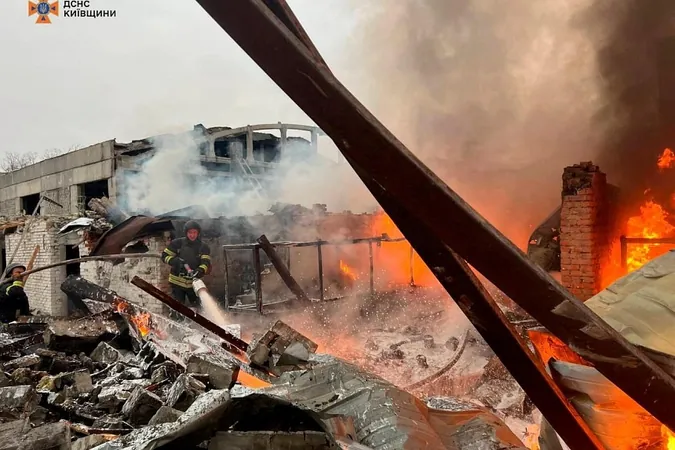
Massive Missile Strike: Russia’s Bold Assault on Ukraine's Power Infrastructure
2024-11-17
Author: Li
KYIV - A dramatic wave of explosions erupted across Ukraine, particularly in the capital Kyiv, early on November 17, as Russia unleashed one of its most extensive missile strikes since August. With the harsh winter rapidly approaching, the assault was aimed directly at power facilities, exacerbating fears of widespread blackouts and psychological warfare during a pivotal stage of the ongoing conflict that began in February 2022.
Ukrainian Energy Minister German Galushchenko took to social media, announcing, 'Another massive attack on the power system is under way. The enemy is attacking electricity generation and transmission facilities throughout Ukraine.' This statement comes as Ukrainians have been on high alert for such an escalation, anticipating that damage to the grid could lead to crippling energy shortages.
As night fell, residents heard the sounds of air defenses engaged against incoming drones. The morning brought a series of powerful blasts that resonated across the city center, signaling the magnitude of the assault. While the immediate extent of the damage was unclear, officials proactively cut power to numerous districts in Kyiv, as well as surrounding areas and the Dnipropetrovsk region, to prevent potential surges in the event of strikes.
The Volyn region officials reported damages to energy infrastructure but refrained from providing further details, a common practice due to the sensitivity of the ongoing military situation. In Mykolaiv, a drone attack resulted in the tragic deaths of two individuals, according to the regional governor. Other cities, including Zaporizhzhia and Odesa, faced blasts that shook their foundations.
Ukraine's Foreign Minister Andrii Sybiha condemned the strike, labeling it one of the largest air assaults targeting civilian areas and critical infrastructure. He remarked that the attack represented Moscow’s 'true response' to international leaders who engaged with President Putin, notably pointing to the recent phone call by German Chancellor Olaf Scholz, which marked a significant communication gap since late 2022.
In a precautionary move, NATO member Poland, which shares a border with Ukraine, scrambled its air force in response to the escalating threat posed by Russia-initiated attacks that utilized a mixture of cruise missiles, ballistic missiles, and drones. 'We activated all available forces,' a statement from Poland’s operational command declared, underscoring the heightened state of military readiness at the western edge of the conflict.
Meanwhile, Ukraine's air force urged civilians to take cover, continuously updating the public on the trajectory of the Russian missiles currently traversing Ukrainian airspace. In Kyiv, falling debris ignited a fire on the roof of a residential building, resulting in injuries to at least two people, which prompted immediate action from emergency services.
This missile strike marks a notorious chapter in the ongoing conflict, reminiscent of the last significant assault on Kyiv on August 26, which involved over 200 drones and missiles, leading to the unfortunate fatalities of seven individuals. As the situation continues to unfold, the battleground remains intensely volatile, with every development sending ripples of uncertainty throughout Ukraine and beyond.



 Brasil (PT)
Brasil (PT)
 Canada (EN)
Canada (EN)
 Chile (ES)
Chile (ES)
 España (ES)
España (ES)
 France (FR)
France (FR)
 Hong Kong (EN)
Hong Kong (EN)
 Italia (IT)
Italia (IT)
 日本 (JA)
日本 (JA)
 Magyarország (HU)
Magyarország (HU)
 Norge (NO)
Norge (NO)
 Polska (PL)
Polska (PL)
 Schweiz (DE)
Schweiz (DE)
 Singapore (EN)
Singapore (EN)
 Sverige (SV)
Sverige (SV)
 Suomi (FI)
Suomi (FI)
 Türkiye (TR)
Türkiye (TR)